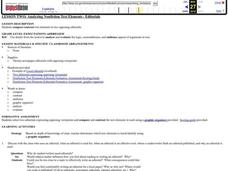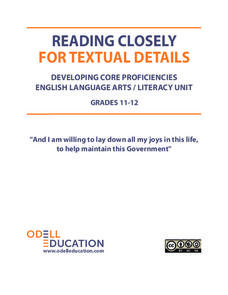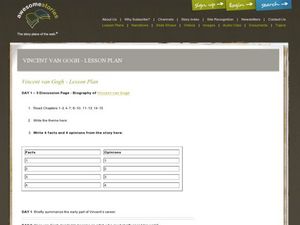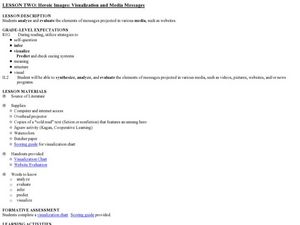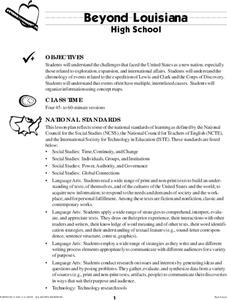Curated OER
Analyzing Nonfiction Text Elements - Editorials
Students examine the text features of non-fiction. In this literacy lesson, students read editorial samples provided by their instructor and analyze the texts for word choice, details, and organization.
Maryland Department of Education
The Concept of Diversity in World Literature Lesson 8: Nonfiction Close Reading
As part of their study of Things Fall Apart, class members conduct a close reading of a section of Chinua Achebe's essay, "An Image of Africa: Racism in Conrad's Heart of Darkness." Jigsaw groups then compare the voice in the essay...
Odell Education
Reading Closely for Textual Details: "And I am willing to lay down all my joys in this life..."
Look closely, some details are hidden! Scholars learn how to find attributes by first examining characteristics in illustrations and then move to locating details in text with close reading. The teacher models good practices for...
Curated OER
The Learning Network: Poetry Pairing July, 21, 2011
Although not a complete lesson plan, this set of emotionally powerful texts could be used in a variety of lessons. From The New York Times' Learning Network site, the resource includes a poem, an excerpt from a New York Times article and...
Curated OER
Awesome Stories: Vincent van Gogh
Who was Vincent van Gogh? Most of the questions can be answered in two or three sentences; however, there is at least one essay prompt and one personal response question that require longer answers. Questions call for a good mix of...
Curated OER
Writing Prompts for High School
Are you teaching a high school language arts class and stumped for writing topics? Five pages of writing prompts for all kinds of writing should help you out. Many of these prompts refer to texts that are not included in this resource,...
Madison Public Schools
Journalism
Whether you are teaching a newspaper unit in language arts, covering the First Amendment and censorship in social studies, or focusing on writing ethics in journalism, a unit based on the foundations of journalism would be an excellent...
Curated OER
Performance-Based Assessment Practice Test (Grade 11 ELA/Literacy)
Support your eleventh graders with a practice assessment for the Common Core tests. The practice test features a series of literary and informational passages and related multiple choice and essay questions. An online version is also...
Curated OER
Brochure Writing
What do you use a brochure for? Middle schoolers or underperforming high schoolers identify the attributes of informative brochures. Either bring in a few brochures you've collected or use the sample brochures attached here. While...
Curated OER
Putting it all Together
Students take notes and summarize information. In this communication lesson, students summarize information by taking notes using the various methods that their instructor presents to them. Students then write summaries of the information.
Curated OER
Heroic Images: Visualization and Media Messages
Students examine media messages. In this media awareness activity, students analyze online messages about heroism as they complete a jigsaw reading activity.
Curated OER
Beyond Louisiana
Students examine the challenges that faced the United States as a new nation, especially those related to exploration, expansion, and international affairs. They study the chronology of events related to the expedition of Lewis and Clark.
Curated OER
Beneath the News: Who's Doing What to Whom, and Who Cares?
Students investigate the differences between various forms of media (print, radio, TV, Internet). They determine the target audience for each and compare exposure around the world. They write a short story and share it with the class.


